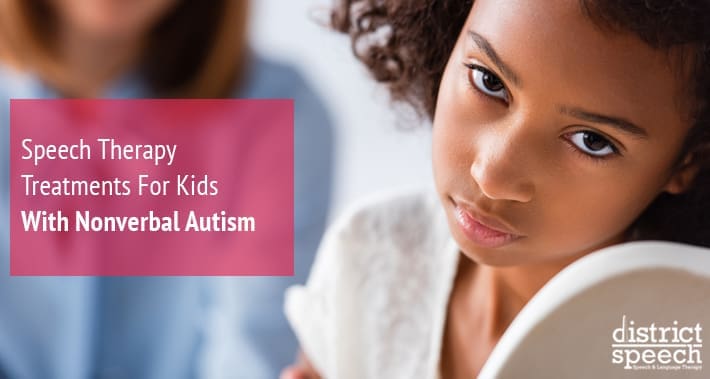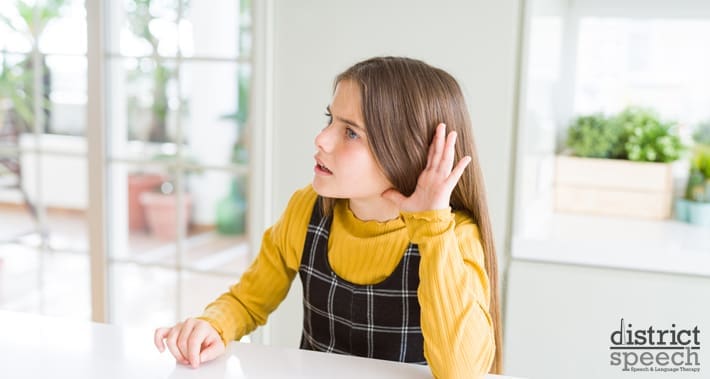
As a parent, you want what’s best for your child.
No doubt you’ve researched everything from play activities, to diet, to daycares in an effort to give your child every possible advantage.
Hearing the news that your child has a developmental disability like autism spectrum disorder may feel disheartening.
Will your child be able to keep pace with their peers?
How will their life be affected?
Was there anything you could have done differently?
It’s natural to worry about your child, but it’s also important to know that there’s help available.
It is possible for nonverbal autistic children to live long, happy, and healthy lives.
If your child is non verbal, you may want to consider speech therapy for kids.
At District Speech, we provide speech therapy in Washington, and today we’ll take a look at how speech therapy can help non verbal autistic children.
Keep reading to learn more.
What Is Nonverbal Autism?
Nonverbal autism falls under the umbrella of autism spectrum disorder (ASD).
If your child is autistic, you’ve likely noticed that their ability to socialize and communicate may be impacted.
Your child may also experience differences in their development and behaviour compared to their typically developing peers.
Not all autistic children are nonverbal.
However, up to 30% of autistic children are minimally verbal or nonverbal.
Let’s look at how to recognize nonverbal autism, and some ways speech therapy can help improve communication.
What Are The Symptoms Of Nonverbal Autism?
If your child cannot speak clearly without interference, they may have nonverbal autism.
Many autistic children can speak, although they may have difficulty with certain aspects of communicating or keeping up the back and forth of a conversation.
However, children who are nonverbal can’t speak at all.
There are many reasons why a nonverbal autistic child may not speak.
It’s important to understand that being nonverbal isn’t a refusal to speak.
Some children who are nonverbal don’t speak because they can’t, due to something like childhood apraxia of speech.
This occurs when your child’s brain has trouble sending the signals it needs to coordinate the muscle movements of speech.
Other autistic children may be physiologically capable of speech, but may have other developmental experiences that makes speaking challenging.
An inability to speak is the main symptom that differentiates nonverbal autism from other autism.
However, being nonverbal on its own doesn’t necessarily mean your child is autistic.
There could be another explanation, such as selective mutism or hearing loss.
If you think your child may be autistic, there are other signs to look out for.
These are often divided into three categories: social, developmental, and behavioural.
Social symptoms involve having issues with social interaction, and include:
- Avoiding eye contact
- Not recognizing/respecting personal space
- Resisting physical contact
- Struggling to participate in back and forth communication
Behavioral symptoms include:
- Being upset at interruptions in routine
- Intense or obsessive interests and fixations
- Short attention span
- Repetitive behaviours and movements, also called stimming
Developmentally, they will often be delayed compared to other children of their age.
You might notice that compared to other children their age, your child struggles with things like their gross motor skills and fine motor skills.
RELATED: How Can Speech Therapy & Physical Therapy Help With Autism Spectrum Disorder?
What Are The Early Signs Of Nonverbal Autism?
According to the Centers for Disease Control, most cases of nonverbal autism can be recognized by the age of two.
Signs to watch for include:
- Not responding to their own name by the time they turn one year old
- Unusual reactions to sounds, smells, taste, touch
- Not showing interest in objects (such as pointing at an airplane overhead) by 14 months
- Hand flapping, spinning in circles or rocking their body
- Not playing “pretend” by 18 months
- Showing obsessive interest in things
- Avoidance of eye contact
- Upset by small changes to routine
- Delayed speech and language skills
- Trouble understanding feelings
- Preferring to play independently from other children
- Inappropriate facial expressions
RELATED: Frequently Asked Questions About Autism Spectrum Disorder

How Can Speech Therapy Help With Nonverbal Autism?
Every child should have some way of communicating their needs with those around them.
With the proper tools, even children who never learn to speak become able to communicate and advocate for themselves.
If you suspect your child has nonverbal autism, there are a variety of ways speech therapy can help them to develop communication skills.
Let’s have a look at some strategies which can help.
1. Determining If Speaking Is An Option
Some children who are nonverbal may be able to develop the ability to speak with some practice.
Having them attempt to imitate sounds or simple words can show whether or not further developing speech may be a viable option.
If they are able to form basic sounds, then further speech development is likely possible.
2. Finding And Employing An Alternate Communication Method
If verbal communication doesn’t seem possible, a speech therapist can help your child access augmentative and alternative communication (AAC).
These can include:
- Body language
- Gestures
- Pictures boards or picture exchanges
- Object symbols
- Sign language
- Written messages
- Voice output devices
Often, even if your child can communicate verbally, AAC may help make their communication more efficient.
AAC can even be used to support your child in developing more verbal communication by encouraging them to communicate independently.
3. Teaching Them To Follow Directions
For directions which are given routinely day to day, creating picture cues can help them learn to follow directions.
To do this, make a list of instructions or directions you are using regularly with your child, and create picture cues to go with them.
You can use positive reinforcement, such as access to a favorite toy, to help teach your child these cues and reinforce learning.
4. Teaching Them To Imitate Others
Children who don’t have the developmental issues associated with autism, generally learn to imitate others at a young age.
This imitation is important for social interactions.
Although it often doesn’t come naturally to autistic children, this skill can be taught.
Start with easy, whole body gestures and work up to complex actions and fine motor skills.
5. Teaching Other Skills
There are other skills that are important for children to develop that involve communication.
Things like learning to request a favorite toy or learning turn taking are important for every child.
This is especially true for autistic children, as these things may not come naturally for them.
A speech therapist can help teach your child ways to communicate “my turn”, and then as they get older “in a minute” and learning to take turns.
Book Your Appointment With District Speech Today
Are you worried your child isn’t developing at the same rate as their peers?
Maybe they’re not speaking at the same rate of other children at preschool.
Or you seem to recall their older sister or brother was speaking in full sentences by now.
District Speech can help.
One of our professional speech therapists can perform an assessment of your child’s development, and offer solutions to help with speech development.
Book your appointment with District Speech today.
1300 I St NW, Suite 400 E,
Washington, DC 20005
- https://g.page/districtspeech
District Speech and Language Therapy specializes in speech therapy, physical therapy, and occupational therapy solutions, for both children and adults, in the Washington D.C and the Arlington Virginia areas.